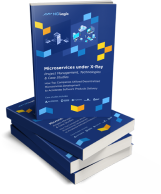In the dynamic world of finance, staying ahead of the curve requires more than just traditional methods. As technology continues to evolve, the role of data science becomes increasingly crucial in deciphering complex financial landscapes.
In this article, we’ll delve into the significance of data science in finance, its applications, the responsibilities of financial data scientists, and the exciting opportunities and challenges within this domain.
Why is Data Science Important?
It’s not just a buzzword. The financial sector deals with vast amounts of data daily, from market trends and customer behavior to risk assessments.
Data science provides the tools to analyze and interpret this data, uncovering valuable insights that can guide decision-making processes. For instance, machine learning algorithms can predict market trends, helping investors make informed choices and mitigating risks.
How Is Data Science Used in Finance?
Data science is omnipresent in finance, enhancing various aspects such as risk management, fraud detection, and customer experience. Risk analysts employ statistical models to assess and predict potential risks, ensuring financial institutions can safeguard their assets.
Fraud detection algorithms use anomaly detection techniques to identify unusual transaction patterns, protecting both financial institutions and their clients.
What Does A Financial Data Scientist Do?
A financial data scientist is a multifaceted professional who navigates the intricate intersection of finance, mathematics, and programming. Their expertise is crucial in unraveling insights from complex datasets, enabling informed decision-making within the financial landscape.
Here is a detailed breakdown of the responsibilities and skills encapsulated within the role of a financial data scientist:
- Data Analysis and Exploration:
- Conduct exploratory data analysis to understand the structure and patterns within datasets.
- Identify outliers, trends, and correlations that can influence financial outcomes.
- Hypothesis Formulation and Testing:
- Formulate hypotheses based on the analysis of historical data and market trends.
- Design experiments to test hypotheses and validate assumptions using statistical methods.
- Predictive Modeling:
- Develop and implement predictive models to forecast financial trends and market behavior.
- Utilize machine learning algorithms, such as regression analysis and decision trees, to build robust models.
- Programming Skills:
- Proficiently use programming languages such as Python or R for data manipulation, analysis, and model implementation.
- Develop algorithms and scripts to automate repetitive tasks in the data science workflow.
- Stakeholder Collaboration:
- Collaborate with stakeholders, including financial analysts, executives, and business leaders, to understand their objectives and information needs.
- Effectively communicate complex technical findings to non-technical audiences, translating data-driven insights into actionable strategies.
- Risk Assessment:
- Assess and quantify risks associated with financial decisions, utilizing statistical models to estimate potential outcomes.
- Implement risk management strategies based on data-driven insights to safeguard financial assets.
- Algorithmic Trading Strategies:
- Design and implement algorithms for algorithmic trading, optimizing trading strategies for maximum returns.
- Monitor and adjust algorithms in real time to adapt to market changes and fluctuations.
- Credit Scoring and Decision Models:
- Develop credit scoring models to assess the creditworthiness of individuals or businesses.
- Design decision models to support lending and investment decisions based on risk profiles.
- Continuous Learning and Adaptation:
- Stay ahead of the latest developments in data science, machine learning, and financial technology.
- Adapt methodologies and models in response to changes in financial markets and regulations.
- Ethical Considerations:
- Navigate ethical considerations related to data privacy, security, and responsible use of financial data.
- Uphold professional standards and ensure the ethical handling of sensitive financial information.
Role-Specific Responsibilities For A Financial Data Scientist
In the realm of financial data science, the responsibilities of professionals can be highly specialized, depending on their specific roles within the industry.
Quantitative analysts, for instance, are tasked with developing mathematical models to evaluate financial instruments and market trends. Their expertise lies in analyzing extensive datasets to discern patterns and correlations that inform quantitative trading strategies. Collaborating closely with traders and portfolio managers, they optimize investment strategies based on the insights derived from these models.
Risk analysts, on the other hand, focus on assessing and quantifying financial risks associated with market fluctuations, credit exposure, and operational factors. They build risk models that predict potential losses and evaluate the impact on financial portfolios. Stress testing and scenario analysis are routine activities undertaken by risk analysts to gauge the resilience of financial systems under adverse conditions.
Algorithmic traders design and implement strategies for automated trading, leveraging algorithms that factor in market signals, raw data, and technical indicators. Their role includes constant optimization of trading algorithms for speed, efficiency, and risk management. Real-time monitoring and adjustment of algorithms ensure adaptability to changing market conditions.
Credit risk analysts specialize in evaluating the creditworthiness of individuals, businesses, or financial entities. They develop credit scoring models using historical data and relevant financial metrics, collaborating closely with underwriters and lending teams to make informed credit decisions.
Portfolio analysts are tasked with analyzing and optimizing investment portfolios based on risk-return profiles. Using statistical models, they assess the performance and volatility of financial assets, providing recommendations for portfolio diversification and asset allocation. Monitoring and reporting on its performance are integral to their responsibilities.
Financial fraud analysts utilize data science to develop models and algorithms for detecting unusual patterns indicative of fraudulent activities. Collaboration with cybersecurity teams enhances fraud detection measures, and the implementation of machine learning techniques aids in anomaly detection within transaction data.
In the fintech sector, data scientists also contribute to the development of innovative solutions. They utilize machine learning to enhance user experience and recommendation systems. Analyzing customer behavior and transaction data allows them to improve product offerings, and collaboration with software developers ensures seamless integration of data science solutions into fintech platforms.
What Experience Do You Need To Become a Data Scientist In The Finance Industry?
To thrive in the finance industry as a data scientist, a strong educational background in fields such as statistics, mathematics, or computer science is essential. Additionally, hands-on experience with programming languages like Python or R, expertise in data manipulation tools, and a deep understanding of financial concepts are highly valued.
Opportunities and Challenges In Data Science For Finance
While data science in finance offers unparalleled opportunities for innovation and efficiency, it also presents challenges. Issues such as data privacy concerns, ethical considerations, and the need for constant adaptation to evolving technologies pose challenges that financial data scientists must navigate adeptly.
Financial Data Scientist Salary
The demand for skilled financial data scientists has surged, leading to competitive salaries in the industry. Salaries can vary based on experience, location, and the specific role. On average, a financial data scientist can earn a substantial income, making it a lucrative career choice.
Skills Necessary For Financial Data Scientists
A data analyst in the finance sector needs a combination of both technical and soft skills to excel in their role.
Hard Data Science Skills For The Finance Sector
- Proficiency in using statistical techniques and tools for data analysis.
- Strong understanding of regression analysis, time series analysis, and hypothesis testing.
- Proficiency in programming languages such as Python, R, or SQL for data manipulation and analysis.
- Skill in creating clear and compelling visualizations using tools like Tableau, Power BI, or matplotlib.
- Experience with database systems like SQL Server, MySQL, or Oracle for efficient data retrieval.
- Advanced skills in Excel for data cleaning, manipulation, and analysis.
- Basic understanding and application of machine learning algorithms for predictive modeling.
- Knowledge of financial modeling techniques for forecasting and decision-making.
- Familiarity with risk assessment methodologies and models.
- Understanding of algorithmic trading concepts and strategies.
- Knowledge of data warehousing concepts and technologies for handling large datasets.
Soft Skills For Data Scientists
- Ability to analyze complex data sets and derive actionable insights.
- Meticulous attention to detail to ensure accuracy in financial analyses.
- Strong problem-solving skills to address challenges in data analysis and interpretation.
- Effective communication skills to convey complex data findings to non-technical stakeholders.
- Capacity for critical thinking to evaluate data quality and draw valid conclusions.
- Understanding of business processes and financial concepts to align data analyses with organizational goals.
- Ability to handle sensitive financial information with integrity and ethical judgment.
- Collaboration skills to work effectively with cross-functional teams, including finance professionals and IT specialists.
- Willingness and ability to adapt to new technologies, tools, and methodologies.
- Efficient time management skills to handle multiple tasks and meet deadlines in a fast-paced financial environment.
- Commitment to continuous learning to stay updated on the latest advancements in data analytics and finance.
Real-time Analytics in Financial Data Science
Real-time analytics stands as a transformative force within the realm of financial data science. It involves the continuous monitoring of market trends, tracking transactions as they unfold, and promptly assessing risk factors. This capability empowers financial institutions with the agility to make swift and well-informed decisions. The real-time nature of analytics provides a dynamic and responsive framework, allowing professionals in the finance sector to adapt to market changes promptly, identify emerging patterns, and respond to potential risks in advance. This immediacy is particularly crucial in a landscape where split-second decisions can have significant implications, offering financial institutions a competitive edge in navigating the intricacies of the ever-evolving financial markets.
Building A Portfolio Of Financial Data Science Projects
Aspiring financial data scientists can stand out by showcasing a portfolio of projects. These projects could range from developing predictive models for stock prices to creating algorithms for credit scoring. A robust portfolio not only demonstrates practical skills but also serves as a testament to one’s passion and commitment to the field.
In Conclusion
Data science has become the backbone of the finance industry, offering unparalleled opportunities for those with the skills to harness its power. As the financial landscape continues to evolve, the role of financial data scientists will only become more integral, shaping the future of finance through innovation and data-driven decision-making.














 +1 (888)
413 3806
+1 (888)
413 3806